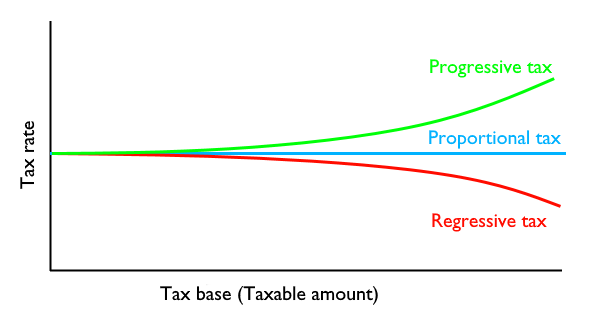
A regressive tax is a tax the effective rate of which decreases for persons or entities with a greater taxable amount or ability to pay.
The opposition leader argued that existing income tax loopholes accessible only to those able to afford complex tax optimization services effectively amount to a regressive tax.
A regressive tax is a literal example of a poverty tax, because the poor are taxed more than the rich. Its opposite is a progressive tax, which has tax rates that are progressively higher for increasingly larger taxable amounts and taxes the rich more than the poor and middle classes. A proportionate or flat tax, which applies the same rate to everyone, might appear at first view to be most fair, but such tax structures are typically regressive in practice. A flat income tax rate or a value-added tax applied to all goods and services equally is in fact regressive. That is because a) people with lower incomes end up paying a larger proportion of their incomes or wealth on such necessities as food, heating, and basic clothing, and b) there exist tax loopholes and tax avoidance schemes that are more readily available to high-income individuals and large corporations but typically altogether inaccessible to the poor.
Regresivní daň je daň, jejíž efektivní sazba klesá pro osoby s vyšší zdanitelnou částkou nebo schopností platit.
Vůdce opozice argumentoval, že stávající mezery v dani z příjmu, které jsou dostupné pouze těm, kdo jsou schopni si dovolit kompletní služby daňové optimalizace, v zásadě odpovídají regresivní dani.
Regresivní daň je doslovným příkladem daně z chudoby, protože chudí jsou daněni více než bohatí. Jejím protikladem je progresivní daň, která má postupně vyšší daňové sazby pro vyšší zdanitelné částky a bohatí jsou daněni více než chudí a střední třída. Rovná daň, která má stejnou sazbu pro všechny, se může na první pohled zdát nejspravedlivější, ale tyto daňové struktury jsou typicky v praxi regresivní. Rovná daň z příjmu nebo daň z přidané hodnoty aplikovaná na všechno zboží a služby rovnoměrně je ve skutečnosti regresivní. Je tomu tak proto, že a) lidé s nižším příjmem nakonec platí větší podíl ze svého příjmu nebo jmění na nezbytnosti jako potraviny, topení a základní oděvy, a b) existují daňové úlevy, kličky, a schémata daňových úniků, které jsou dostupnější osobám s vysokými příjmy a velkým korporacím, avšak jsou typicky zcela nepřístupné pro chudé.
English Editorial Services’ mission is to assist international businesses and organizations of all sizes to communicate clearly, correctly, and persuasively with their business partners and target audiences.
Simply subscribe to receive our Business Term of the Day at no charge to your inbox each business day, with explanation in English and Czech.



English Editorial Services’ mission is to assist international businesses and organizations of all sizes to communicate clearly, correctly, and persuasively with their business partners and target audiences.
Simply subscribe to receive our Business Term of the Day at no charge to your inbox each business day, with explanation in English and Czech.

